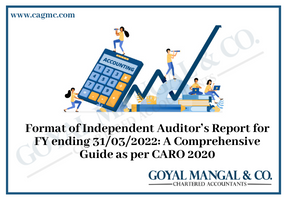In today’s business world, it is essential to have a clear understanding of legal terms and concepts. The Companies Act, 2013 governs the formation, management, and dissolution of companies in India. Three essential terms under the Companies Act, 2013, are Compromise, Arrangement, and Amalgamation. These terms are crucial for understanding the legal aspects of corporate…
In India, every company registered under the Companies Act, 2013, is required to file annual returns and financial statements with the Registrar of Companies (RoC). E-Form AOC-5 is an important document that contains the financial statements and other related information that companies have to submit to the RoC. Table of Content What is E-Form AOC-5?…
Limited Liability Partnership (LLP) is a form of business that combines the features of a traditional partnership and limited liability. This form of business is governed by the provisions of the Limited Liability Partnership Act, 2008. Limited Liability Partnership (LLP) is governed through the rules of Limited Liability Partnership Act, 2008. In today’s time an…
Mergers and Acquisitions (M&A) have become a vital part of the Indian corporate landscape, with many businesses looking for growth through consolidation. India has witnessed an increase in M&A activities in recent years, and the trend is likely to continue in 2022. In this article, we will explore the footprints of Merger and Acquisition Deals…
The Ministry of Corporate Affairs (MCA) has introduced SPICe+ Form and all the connected forms on February 23, 2020, replacing the current SPICe Form and all linked forms with a variety of services to be provided under a single application. The initiatives taken by the Government over the last few years has significantly advanced the…
In India, the Companies Act, 2013 (“Act”), governs the formation and management of companies. A company is a legal entity that can undertake business operations in its name. It can sue and be sued in its name, own property, and enter into contracts. The Act specifies different types of companies that can be formed in…
Company and LLP name reservation application is an important step in the registration process of any business entity. However, it is not uncommon to face rejection or resubmission of the application due to errors or discrepancies in the application. This can lead to delays in the registration process and affect business operations. In this article,…
Depreciation is the reduction in the value of an asset over time due to wear and tear, obsolescence, or other factors. In accounting, depreciation is used to allocate the cost of an asset over its useful life. The Companies Act, 2013 provides guidelines for the calculation and accounting of depreciation for companies operating in India….
The Companies (Auditor’s Report) Order, 2020 (CARO 2020) lays down the format for the independent auditor’s report. The auditor’s report is an important document that is prepared by the auditor of a company, outlining their opinion on the financial statements and internal control systems of the company. This article gives you the format of Independent…
The Ministry of Home Affairs issued a notification on 01 June 2022 seeking to amend the Companies (Appointment and Qualification of Directors) Rules, 2014. According to the amendment, it will be mandatory to obtain security clearance for persons from countries sharing a land border with India before being appointed as directors on the boards of…









